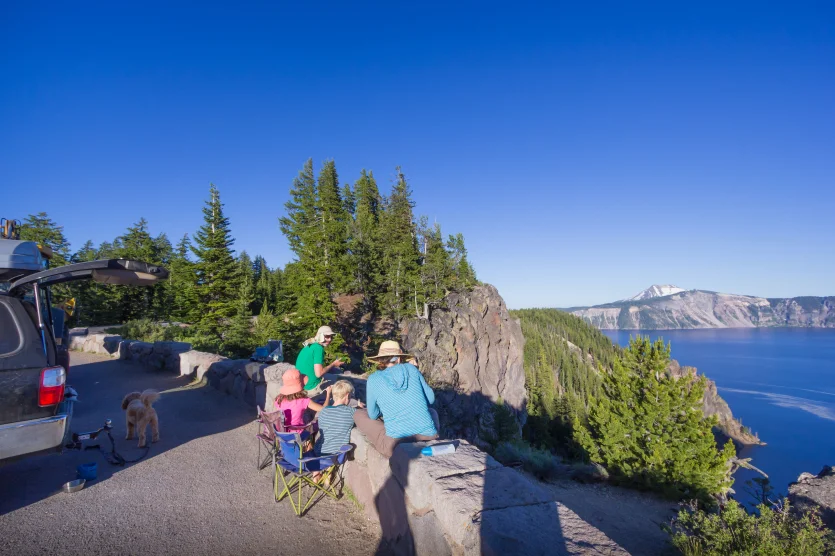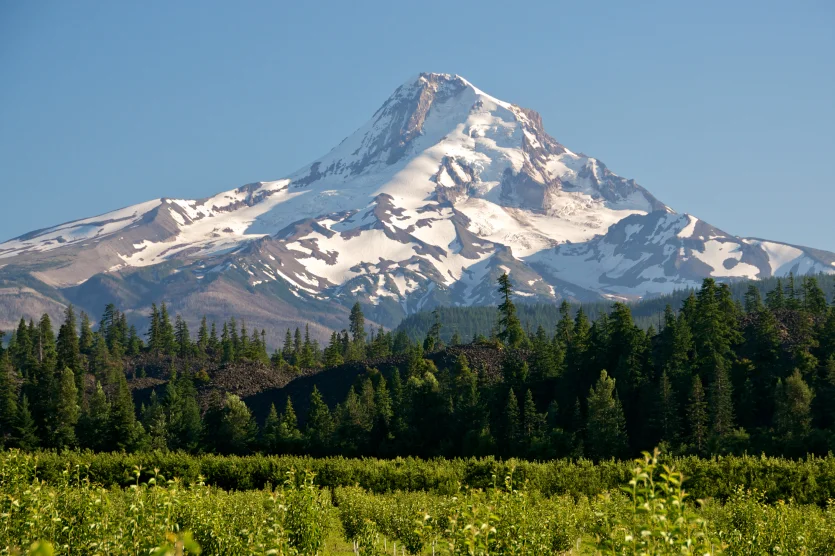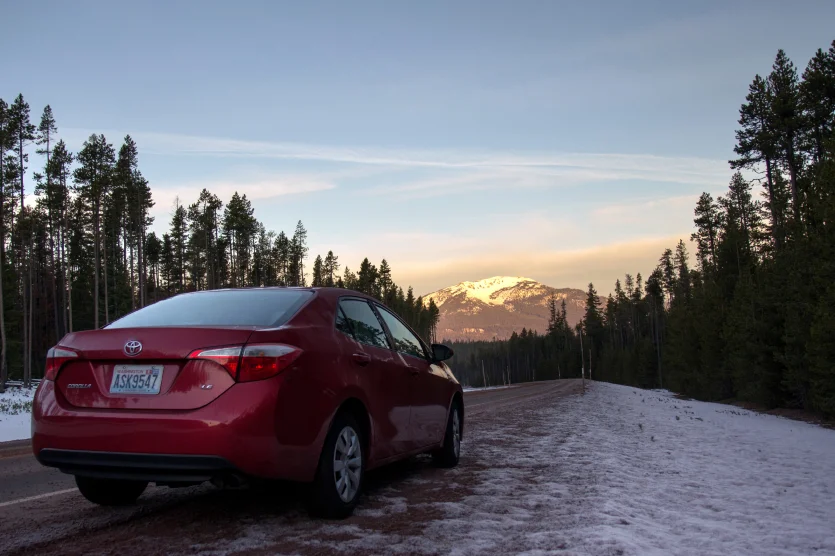
Oregon Car Insurance
Everything You Need To Know About Auto Insurance in Oregon
Known for its rugged, rocky coastline and evergreen forests, Oregon spans 98,381 square miles, making it the nation’s ninth-largest state — home to more than 4.2 million people. Its highest peak — the summit of Mount Hood — is 11,249 feet tall, while its lowest point is the sea level of the Pacific Ocean, which hugs the western coast.
Europeans first entered this region during the mid-16th century, when Spanish fleets in the Phillippines sailed to the Oregon coast in 1564. The land, which had been home to several Native American tribes for thousands of years, would welcome countless explorers and settlers in the centuries that followed, such as the Lewis and Clark Expedition of the early 1800s, along with fur trappers and traders who established settlements here, following the Oregon Trail.
If you visit or live here, don’t miss out on visiting Crater Lake with its lava cliffs and deep blue water. You can also enjoy the beach vibes at Cannon Beach, hiking at Mount Hood or head “west” for a day to Sisters, a western-themed town near the Cascade Mountains.
If you’re looking for an affordable auto policy to keep you and your loved ones safe on the road, InsureOne expert agents can help you find the best auto insurance at a great rate in Oregon.
How Much Does Car Insurance Cost in Oregon?
On average, Oregon drivers pay annual auto premiums of around $1,415 for a full coverage policy and around $616 for a basic one.
Oregonians pay $599 less than the national average for annual full coverage premiums, which stands at $2,014. They pay $6 less for basic coverage than the national average, which is $622.
Reasons Why Insurance Is So Cheap in Oregon
While premiums in the Beaver State trend cheaper than national averages, that’s likely because several cities and towns aren’t as densely populated as Portland, Eugene, or Salem. These three cities see more traffic than others, which typically influences premiums due to the risks inherent in driving in denser areas. Because most of Oregon consists of smaller towns and cities with fewer residents, those numbers decrease the state’s average auto coverage rates.
Affordable Car Insurance Rates Comparison by Cities in Oregon
For a comparison of the average monthly premiums drivers pay in different cities across the state, check out our breakdown below.
| City | Full Coverage Insurance | Liability Insurance Coverage |
|---|---|---|
| Portland | $130 | $61 |
| Salem | $119 | $57 |
| Eugene | $96 | $44 |
| Bend | $95 | $40 |
| Grants Pass | $97 | $41 |
We arrive at our average auto insurance costs by using a male driver, aged 30 with a clean driving record. Minimum liability is the state-required minimum. Full coverage is a 100K/300K/100K policy. Your costs will be different and based on your individual factors.

How Bundling Your Vehicle and Homeowners Insurance Can Save You Money in Oregon
Policyholders who bundle (or combine) coverage typically save more than those who don’t, reducing annual premiums anywhere between 5% and 25%. This is especially beneficial for homeowners, who tend to pay more for insurance than renters.
If you own a house in Portland, Eugene, or Bend, for example, and you bundle your home and auto coverage, you’ll likely see a 25% reduction — the maximum discount. Similarly, if you rent an apartment anywhere in Oregon, you can get up to 15% off your annual premium.
Whether you own or rent your home, an InsureOne agent can help you build a quality insurance package that meets your needs and budget. They do all the work, comparing offerings from top providers, which saves you time and money.
What Types of Auto Discounts Are Available in Oregon?
Insurers offer discounts to help you save money on your premiums, especially if you’re eligible for more than one. If you own a house and lease two cars, for example, bundling home and auto coverage could bring your rate down by as much as 25%.
Other rate-reducing discounts include:
- Good driver
- Defensive driver
- Low mileage
- Anti-theft
- Loyalty
- Good student
Oregon Car Insurance Laws
Oregon has a 25/50/20 minimum mandatory liability coverage requirement, and drivers must always carry proof of having it. Here’s a closer look at what this means.
What Are the Mandatory Car Insurance Requirements in Oregon?
State law sets mandatory monetary limits (or cash amounts) that insurers must pay if a policyholder causes a crash. In Oregon, these limits are 25/50/20. That means if you cause a crash, your policy must provide:
- $25,000 in bodily injury per person with up to $50,000 for two or more people
- $20,000 in property damage
Your policy must also include:
- 25,000 in uninsured motorist coverage per person, with up to $50,000 per accident
- $15,000 in personal injury protection (PIP)
PIP helps cover your medical costs if you’re injured in a car accident, regardless of fault.
What Is the Penalty for Driving Without Insurance in Oregon?
If you’re caught driving without proof of insurance, you’ll likely be fined anywhere between $130 and $1,000, depending on the circumstances involved — for example, a first offense versus a second or third one. Your vehicle might also be impounded, and your license and registration may be suspended for a year.
To get your license and registration reinstated, you may be ordered to file an SR-22 — also known as a Certification of Financial Responsibility — to prove that you have valid auto coverage. This will cause your premiums to soar until the infraction clears from your record, which takes around three years.
What Factors Does Oregon Law Allow in Determining Your Premiums?
Under state law, insurers can use several factors to calculate your auto premium. Some of the most important factors are:
- Gender
- Age
- Driving record and experience
- Credit history
- Marital status
- Location
- Vehicle type
Here’s What You Need to Know When Driving in Oregon
Being a defensive driver pays off in this state, where most crashes are caused by carelessness. According to the Oregon Department of Transportation, the top errors that led to the state’s 45,295 total crashes in 2021were mostly caused by drivers who:
- Failed to avoid a stopped or parked vehicle ahead
- Failed to yield the right of way
- Though not speeding, drove too fast for road or weather conditions
- Were inattentive or distracted behind the wheel
- Followed the vehicle ahead too closely
At InsureOne, our expert agents help you find the best auto insurance with customizable options that best meet your needs.

What Is Driving Like in Oregon?
Known for its forested landscapes and rugged coastline, Oregon’s climate is generally mild but varies depending on where you are. Coastal cities and towns along the western portion of the state experience the most moisture coming in from the Pacific Ocean. Wet weather is the strongest during the winter, spring, and autumn months, making for slick roads and other driving hazards. This region has drier summers, much like the state’s eastern, northeastern, and southwestern portions, where humidity is much lower.
How Many Car Accidents Happen in Oregon?
In 2021, 552 fatal crashes in Oregon resulted in 599 deaths. The following chart shows the number of fatal crashes that took place in various cities across the state that year.
| City | Fatal Crashes in 2021 |
|---|---|
| Portland | 58 |
| Salem | 19 |
| Eugene | 9 |
| Bend | 4 |
| Corvallis | 2 |
| Baker City | 1 |
| Coos Bay | 1 |
| Newport | 1 |
| Ashland | 1 |
| Pendleton | 2 |
| Madras | 2 |
| Medford | 9 |
| Grants Pass | 2 |
Source: U.S. Department of Transportation National Highway Traffic Safety Administration.
How Many Uninsured/Underinsured Motorists Are in Oregon?
More than 10% of Oregon drivers are uninsured or underinsured. In 2019, it ranked no. 30 among states with this growing issue.

Get the Best Car Insurance in Oregon Today
InsureOne offers a one-stop auto insurance shopping experience with expert agents who will listen to your needs and help you find top-quality insurance options that work best for you.
We will save you time and money by researching quotes and presenting you with several options that meet your needs. Get a quote online, visit us a local Oregon office, or call us at (800) 836-2240 for a quote.


